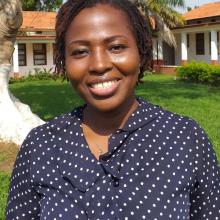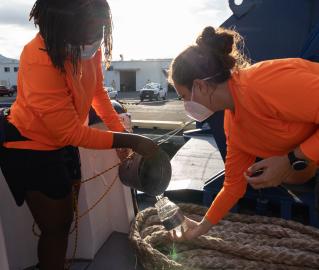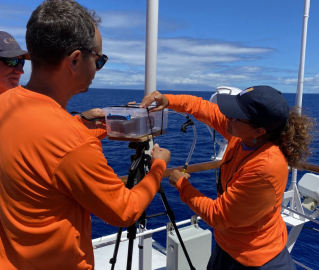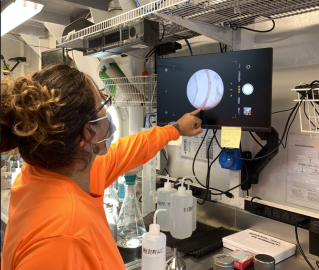
Edem Mahu
What is your history of engagement with the National Geographic Society?
Emerging Explorer Awardee 2021. I currently have a national geographic grant which is in the contractual phase
Tell us about your work/research. What kinds of things do you do?
I am interested in understanding biogeochemical processes that occur between the ocean and land interface. This includes the cycling of elements such as metals and nutrients. To do this, I collect water, sediment, and biological samples from the coastal environment and determine their chemical makeup. My most recent research is focused on understanding past changes in the environmental conditions such as temperature, salinity, pH and dissolved oxygen levels of the West African mangrove oyster using chemical signatures of both dead and live oyster shells as well as examining changes in growth rates through time by studying growth lines in the oyster shells. I am also interested in understanding anthropogenic impacts such as plastic/microplastic pollution and mangrove degradation on the oyster fisheries along the West African Coast. My long-term goal is to build resilience in oyster fisheries in the sub-region to enhance the livelihoods of artisanal communities while enhancing other ecological benefits such as water quality and biodiversity.
What sparked your initial interest in your career?
I have always loved nature, especially the marine world! However, I come from a region where marine science was not recognized as a career promising field. Therefore, to me, that passion for water could become a lifelong hobby while I pursue an academic programme that guarantees a job. Unfortunately for me, I failed to make it to the medical school interview, a disappointment that forced me to go after my passion. Although I knew the huge uncertainties surrounding my decision as far as a career path is concerned, I promised myself to if nothing at all, do it for the love of our planet. I enrolled in the bachelor's programme in Oceanography and Fisheries programme during my third year in the University and continued with a graduate degree (PhD) in Oceanography. Today, I am an ocean conservation advocate and I am so happy about the enormous opportunities this career choice has brought my country, institution and myself.
What element of your work/study is the most fascinating?
The most fascinating thing I have done lately is excavating very old oyster beds in five African Countries to study their geochemistry to reveal past environmental conditions that prevailed in estuaries in the Gulf of Guinea over the last 1000+ years.
What other jobs or skills led you to your current position?
Right from the word go, I promised myself to excel in my field and demonstrate to the several young students I teach and mentor that aside medicine, there are several STEM fields such as oceanography that are promising in Africa if one looks beyond boundaries. I deliberately developed skills for writing for research grants and building international networks. These two skills have contributed immensely to my current position.
What are your degrees and certifications?
Bachelor of Science in Oceanography and Fisheries-University of Ghana 2008, PhD in Oceanography University of Ghana 2014, Two research abroad experiences between 2010-2013 at California State University, San Jose State where I was stationed at the Moss Landing Marine Laboratories.
What are your hobbies?
I love dancing especially to African Music! I love to Hang out on weekends in places where I can get to dance to some live band music. I am gradually becoming a travel addict too! Inviting friends and family home and cooking for them during bank holidays and birthdays is fun for me!
What advice would you give someone who wants to have a career like yours?
To become a successful marine scientist in Africa, you must be prepared to work harder than you would in other fields. Make no room for naysayers! Look beyond boundaries, oceanography is a global science! You may not be recognized or even relevant to people at the onset of your career in your country, but your work may attract international attention. International recognition will lead to national recognition. Giving up due to a lack of capacity and infrastructure should not be in your books. Study your system to understand the barriers to progress and work hard to develop skills that can help you break those barriers and achieve success.
Expeditions
Edem participated in the following Ocean Exploration Trust expeditions:



